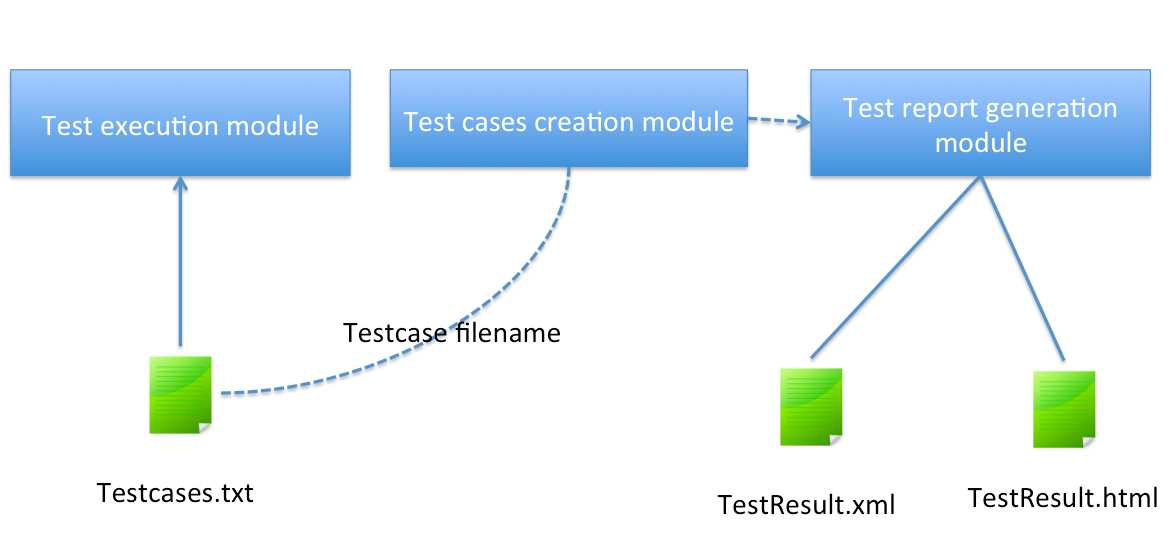简易selenium自动化测试框架(Python)
Posted
tags:
篇首语:本文由小常识网(cha138.com)小编为大家整理,主要介绍了简易selenium自动化测试框架(Python)相关的知识,希望对你有一定的参考价值。
最近空闲时间在探索Selenium的自动化测试,简单的写了一个小框架来测试公司的一个web产品。该框架包括以下模块:

1. Test case编写模式(page模式,参考之前的博文http://www.cnblogs.com/AlwinXu/p/5537955.html)
2. Test case的管理及执行 (主要是用nose)
该模块借助了一个外部txt文件来记录测试用例,每个用例为自身的文件名,如果不需要在本次执行,只需在文件名前添加一个“#”标识符就可以跳过该用例的执行。
3. 测试报告的生成(xml和html两种格式)
对于自动化测试而言,这些模块应该是最基本的配置了,当然还有一些辅助模块比如日志,其他公共库模块等需要根据具体的业务逐渐丰富。闲话少说,用代码交流吧。
测试用例编写
该模块用了Page模式,之前介绍过,这次只贴代码了
BasePage.py:
__author__ = ‘xua‘
#super class
class BasePage(object):
def __init__(self, driver):
self.driver = driver
然后是各个web page继承BasePage,LoginPage.py:
from BasePage import BasePage
from selenium.webdriver.common.by import By
from selenium.webdriver.common.keys import Keys
class LoginPage(BasePage):
"""description of class"""
#page element identifier
usename = (By.ID,‘username‘)
password = (By.ID, ‘password‘)
dialogTitle = (By.XPATH,‘//html/body/div[7]/div/div/div[1]/h3‘)
cancelButton = (By.XPATH,‘//html/body/div[7]/div/div/div[3]/button[2]‘)
#Get username textbox and input username
def set_username(self,username):
name = self.driver.find_element(*LoginPage.usename)
name.send_keys(username)
#Get password textbox and input password, then hit return
def set_password(self, password):
pwd = self.driver.find_element(*LoginPage.password)
pwd.send_keys(password + Keys.RETURN)
#Get pop up dialog title
def get_DiaglogTitle(self):
digTitle = self.driver.find_element(*LoginPage.dialogTitle)
return digTitle.text
#Get "cancel" button and then click
def click_cancel(self):
cancelbtn = self.driver.find_element(*LoginPage.cancelButton)
cancelbtn.click()
测试用例信息类:
TestCaseInfo.py
class TestCaseInfo(object):
"""description of class"""
def __init__(self, id="",name="",owner="",result="Failed",starttime="",endtime="",errorinfo=""):
self.id = id
self.name = name
self.owner = owner
self.result = result
self.starttime = starttime
self.endtime = endtime
self.errorinfo = errorinfo
最后是每个测试用例的编写:(每个用例必须有自己的用例信息,这里有ID,Name等等信息,也会调用测试结果报告生成模块来添加测试结果)
Test_Login.py
__author__ = ‘xua‘
from selenium import webdriver
from selenium.webdriver.common.keys import Keys
from selenium.webdriver.common.alert import Alert
import unittest
import time
from LoginPage import LoginPage
from TestCaseInfo import TestCaseInfo
from TestReport import TestReport
class Test_Login(unittest.TestCase):
#Setup
def setUp(self):
self.driver = webdriver.Chrome(r‘C:\\Users\\xua\\Downloads\\chromedriver_win32\\chromedriver.exe‘)
self.driver.implicitly_wait(30)
self.base_url = "http://10.222.30.145:9000/"
#test case information
self.testcaseinfo = TestCaseInfo(id="3",name="Login to floor manager lite using sbxadmin",owner="xua")
self.testResult = TestReport()
def test_Login(self):
try:
self.testcaseinfo.starttime = str(time.asctime())
#Step1: open base site
self.driver.get(self.base_url)
#Step2: Open Login page
login_page = LoginPage(self.driver)
#Step3: Enter username
login_page.set_username("sbXadmin")
#Step4: Enter password
login_page.set_password("IGTtest1")
#Checkpoint1: Check popup dialog title
self.assertEqual(login_page.get_DiaglogTitle(),"Sign in","Not Equal")
#Step5: Cancel dialog
login_page.click_cancel()
self.testcaseinfo.result = "Pass"
except Exception as err:
self.testcaseinfo.errorinfo = str(err)
finally:
self.testcaseinfo.endtime = str(time.asctime())
#tearDown
def tearDown(self):
self.driver.close()
#write test result
self.testResult.WriteHTML(self.testcaseinfo)
if __name__ == "__main__":
unittest.main()
用例执行模块
1. 借助外部文件记录需要执行的用例
testcases.txt(带“#”标识的用例不会被执行):
Test_Login.py Test_Login_2.py #Test_Login_3.py Test_Login_4.py
2. 利用nose的nosetests命令执行各个用例:
import subprocess
class RunTests(object):
"""description of class"""
def __init__(self):
self.testcaselistfile = "testcases.txt"
#use nosetests command to execute test case list
def LoadAndRunTestCases(self):
f = open(self.testcaselistfile)
testfiles = [test for test in f.readlines() if not test.startswith("#")]
f.close()
for item in testfiles:
subprocess.call("nosetests "+str(item).replace("\\\\n",""),shell = True)
if __name__ == "__main__":
newrun = RunTests()
newrun.LoadAndRunTestCases()
测试结果报表生成模块
测试报表模块写了两种格式:xml和html
TestReport.py
from xml.etree import ElementTree as ET
import os
import lxml.etree as mytree
from lxml import html
class TestReport(object):
"""description of class"""
def __init__(self):
self.testreport = "TestResult.xml"
#If there is no "TestResult.xml", then create one
def CreateTestResultFile(self):
if os.path.exists(self.testreport) == False:
newElem = ET.Element("TestCases")
newTree = ET.ElementTree(newElem)
newTree.write(self.testreport)
#Write test result to xml
def WriteResult(self,testcaseInfo):
self.CreateTestResultFile()
testResultFile = ET.parse(self.testreport)
root = testResultFile.getroot()
newElem = ET.Element("TestCase")
newElem.attrib = {
"ID":testcaseInfo.id,
"Name":testcaseInfo.name,
"Owner":testcaseInfo.owner,
"Result":testcaseInfo.result,
"StartTime":testcaseInfo.starttime,
"EndTime":testcaseInfo.endtime,
"ErrorInfo":testcaseInfo.errorinfo
}
root.append(newElem)
testResultFile.write(self.testreport)
#If there is no "TestResult.html" file exists, then create one with default style
def CreateHtmlFile(self):
if os.path.exists("TestResult.html") == False:
f = open("TestResult.html",‘w‘)
message = """<html>
<head>
<title>Automation Test Result</title>
<style>
table {
border-collapse: collapse;
padding: 15px;
font-family: "Trebuchet MS", Arial, Helvetica, sans-serif;
}
th{
background-color: green;
color: white;
border: 1px solid #ddd;
padding-bottom: 15px;
padding-top: 15px;
}
tr{
border: 1px solid #008000;
padding-bottom: 8px;
padding-top: 8px;
text-align: left;
}
td{
border: 1px solid #008000;
}
</style>
</head>
<body>
<h1>Automation Test Result</h1>
<table>
<tr>
<th>ID</th>
<th>Name</th>
<th>Owner</th>
<th>Result</th>
<th>StartTime</th>
<th>EndTime</th>
<th>ErrorMessage</th>
</tr>
</table>
</body>
</html>
"""
f.write(message)
f.close()
#append new test result to testresult file
def WriteHTML(self,testcaseinfo):
self.CreateHtmlFile()
f = open("TestResult.html","r")
htmlcontent = f.read()
f.close()
tree = html.fromstring(htmlcontent)
tableElem = tree.find(".//table")
if testcaseinfo.result == "Failed":
mytablerow = "<tr><td>{0}</td><td>{1}</td><td>{2}</td><td bgcolor=\\"#FF0000\\">{3}</td><td>{4}</td><td>{5}</td><td>{6}</td></tr>".format(testcaseinfo.id,testcaseinfo.name,testcaseinfo.owner,testcaseinfo.result,testcaseinfo.starttime,testcaseinfo.endtime,testcaseinfo.errorinfo)
else:
mytablerow = "<tr><td>{0}</td><td>{1}</td><td>{2}</td><td>{3}</td><td>{4}</td><td>{5}</td><td>{6}</td></tr>".format(testcaseinfo.id,testcaseinfo.name,testcaseinfo.owner,testcaseinfo.result,testcaseinfo.starttime,testcaseinfo.endtime,testcaseinfo.errorinfo)
tableElem.append(mytree.HTML(str(mytablerow)))
f = open("TestResult.html","w")
#html.tostring
newContent = repr(html.tostring(tree,method="html",with_tail=False))
newContent = newContent.replace(r"\\n","").replace(r"\\t","").replace(‘b\\‘‘,"")
newContent = newContent[:len(newContent)-1]
f.write(newContent)
f.close()
ok,最后看一下生成的测试报表:

总结
在网上有很多关于Selenium自动化的Best Practice,当然大家也可以根据自己的需求来DIY自己的框架,不管简陋与否,好用才是硬道理:)!
以上是关于简易selenium自动化测试框架(Python)的主要内容,如果未能解决你的问题,请参考以下文章
一python+django+selenium 搭建简易自动化测试平台
Selenium2+python自动化63-简易项目搭建转载
